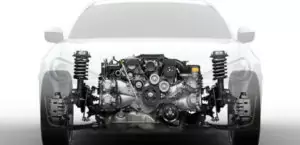The 1.6-liter Toyota 1ZR-FE engine has been produced at several factories at once since 2006 and is primarily known for the most popular models of the Japanese concern Corolla and Auris. There is a version of this unit for the Chinese market under its own index 4ZR-FE.
This motor debuted in 2006 on the European bestsellers of Corolla and Auris. By design, it was a classic representative of the Japanese engine industry of that time: a cast aluminum cylinder block with cast-iron liners and an open cooling jacket, an aluminum 16-valve cylinder head with two camshafts and equipped with hydraulic compensators, a timing chain drive and a Dual VVT-i phase control system on the intake and exhaust shafts.
Fuel injection is distributed here, and in the intake manifold there is an ACIS type system that changes the length of the intake tract depending on the operating mode of the power unit. Thanks to the ETCS-i electronic throttle, this unit easily fits into EURO 5.
The ZR family includes engines: 1ZR‑FE, 1ZR‑FAE, 2ZR‑FE, 2ZR‑FAE, 2ZR‑FXE, 3ZR‑FE, 3ZR‑FAE.
The engine was installed on:
- Toyota Auris 1 (E150) in 2006 – 2012; Auris 2 (E180) in 2012 – 2013;
- Toyota Corolla 10 (E150) in 2006 – 2013; Corolla 11 (E180) in 2013 – 2019; Corolla 12 (E210) since 2019;
- Toyota Vios 2 (XP90) in 2007 – 2013.
Specifications
| Production years | since 2006 |
| Displacement, cc | 1598 |
| Fuel system | injector |
| Power output, hp | 120 – 125 |
| Torque output, Nm | 150 – 160 |
| Cylinder block | aluminum R4 |
| Block head | aluminum 16v |
| Cylinder bore, mm | 80.5 |
| Piston stroke, mm | 78.5 |
| Compression ratio | 10.2 |
| Hydraulic lifters | yes |
| Timing drive | chain |
| Phase regulator | Dual VVT-i |
| Turbocharging | no |
| Recommended engine oil | 5W-20, 5W-30 |
| Engine oil capacity, liter | 4.2 |
| Fuel type | petrol |
| Euro standards | EURO 4/5 |
| Fuel consumption, L/100 km (for Toyota Corolla 2012) — city — highway — combined |
8.9 5.8 6.9 |
| Engine lifespan, km | ~300 000 |
| Weight, kg | 120 |
Disadvantages of the 1ZR-FE engine
- The motor is considered the most reliable in the series, because the capricious Valvematic system is not here, however, in the first years of the production of this engine, oil consumption and increased carbon formation in the combustion chambers were quite common. But then everything was back to normal.
- On runs from 150 to 200 thousand km, many owners have to replace the timing chain. At the same time, we recommend inspecting the phase regulators, since their resource is about the same.
- The water pump has an extremely low resource, it can flow up to 50,000 km. Often oil oozes around the timing chain tensioner, but replacing its gasket helps.
- The minor problems of this power unit include: leaks from under the valve cover, forever sweating injector o-rings, a periodic wedge of VVT-i valves and floating idle speeds due to contamination of the electronic throttle.






